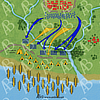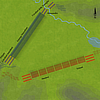

Talking of Ancient Greece means to talk about the polis, or city-state in which ancient Greece was divided. Greece was, and still is, an inaccessible land with few resources and little spaces, a predominantly mountainous land where the plains are small. So it is thus not surprising that the Greeks sought their fortune out of Greece and founded colonies throughout the length and breadth of the Mediterranean, but in addition to migration, there was a strong rivalry between the various Greek city states, a rivalry that found expression in a thing that the Greeks have left us next to the Philosophy and Art, the War. In fact were the Greeks that invented the definition of “Art of War”. Speaking of war, and of ancient Greece, the reference can only go to the hoplites. The Hoplite (the greek soldier par excellence) was a citizen – soldier that, once accomplished his duty as a soldier, returns to his working activity, so that a war could not last long otherwise the economic damage to the polis was huge, which is the reason why a single battle was enough (before the Persian war at least) to end a war between the Greek polis. Armed with his impressive panoply (a term used to describe the whole weapons, shield and armor of the greek hoplite), the hoplite is the undisputed star of Hellenistic conflicts, and not only for his tactical flexibility in mountainous and difficult battlefield as those of Greece itself. The way to fight of the Greeks also stems from their mentality: their myths often speak of heroes who fight hand to hand against their adversaries and the same "Iliad" is filled of duels between the heroes of the two sides, was then considered dishonorable fight with a system that was not the melee. But there were also other reasons why the Greeks disdained to not fighting in other ways: archery or horse fight demanded a practical and ongoing training, but because of the socio-economic status of the citizens that it was not possible (it must also be said that the horses as well needed a plain to be bred and trained, and the only place adapted for the birth of a native cavalry in Greece was Thessaly. This is demonstrated by the fact that Thessalian cavalry was good enough to be added to the quota of Greeks warriors who served in the army of Alexander the Great). Only during the Peloponnesian War began to be conceived and understood the usefulness of bodies of light infantry (peltasts) and cavalry. These units, deployed in a much more advanced tactical plan, brought to the highest form of military development of the Hellenistic world: the Macedonian army, which, thanks to its impressive Sarissa phalanx will rule, until the arrival of the Roman legions, most of the known world under the guidance of one of the most formidable commanders in history, Alexander the Great.
Battles

In the poetic transposition of the Iliad, the first confrontation between the Eastern and Western civilizations.

490 BC
In a small flat area, overlooking the sea, was fight one of the battles-symbol of the european history that will remain forever in the collective memory.

480 BC
The importance of the battle of Salamis, first major naval battle widely documented in history, it's all in the consequences it had on politics and on the entire greek civilization.

480 BC
Thanks to a genial and effective stratagem, the tyrant of Syracuse, Gelo, massacred the Carthaginian army at Himera, nearly extending his own area of influence to whole Greek Sicily and avoiding that the same punics threatened the island for the followings seventy years.

27 August 479 BC
The ultimate defeat of king Xerxes and the end of the Persian wars.

5 July 371 BC
The victory of Epaminondas enacts the crisis from which Sparta will no longer have the strength to recover and the beginning of the Theban hegemony.

338 BC
Philip II defeated Athenians and Thebans, cementing the primacy of Macedonia over the Greek poleis thanks to the contribution of his son Alexander who immediately proves his value on the field.

November 333 BC
With forced marches Alexander encountered and defeated in open field the "King of Kings" Darius III getting a great win and a great massacre.

331 BC
The heroic sacrifice of the spartan king Agide and the conformation of the battleground, were not enough to the spartan army to defeat the Macedonian phalanx under the orders of Antipatros, one among the bravest officers of Alexander the Great. The defeat near Megalopoli represents the true passage of witness among the phalanx from the spartans red mantles and the Macedonian ones armed with sarissa.

1 october 331 BC
Two years after the triumph of Issus, Alexander destroys the last great Persian army led by Darius III, opening the way for the conquest of Asia.

22 June 217 BC
In what will be known as the "battle of elephants", Ptolemy IV defeats Antiochus III King of Syria ensuring, for a short time, the control of the Palestinian area to Egypt.
| Home | Battles Index | Cartography | Chronology | Forum |